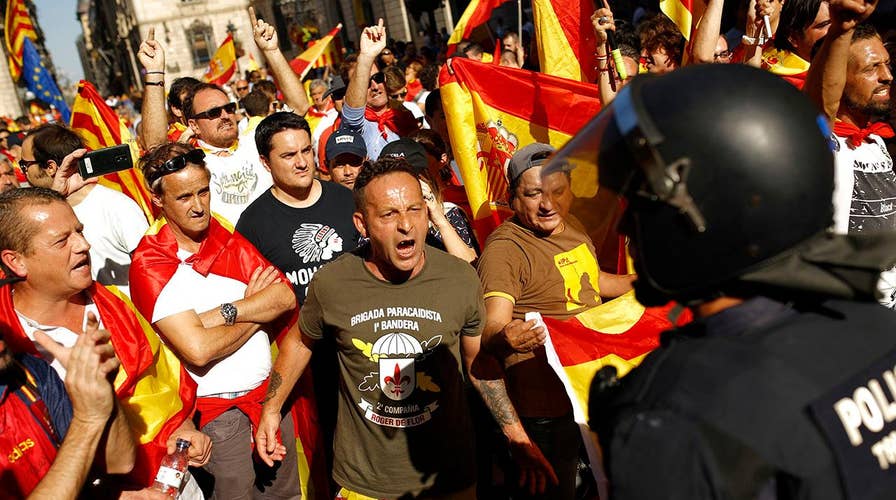Barcelona -- Imagine being in Philadelphia on that day in 1776 when a bunch of bewigged troublemakers declared independence from any foreign power. Something similar happened here Tuesday. The leader of Catalonia's regional government said that, as things stand, being part of Spain is no longer an option – though a formal declaration of independence is on hold as talks with Madrid continue.
“We’re living in an exceptional moment, of historic dimensions,” said a restrained but determined Carles Puigdemont, whose mop-top haircut has been the target of endless mirth across Spain. But Puigdeont’s words held no humor.
Like Jefferson, Adams and Franklin, Puigdemont is facing some pretty long odds in his quest. The long-simmering independence movement he leads came a boil on October 1, when Catalonians voted – or tried to vote – in a referendum to split from Spain. Police broke into polling places, confiscated ballots, and bashed hundreds of would-be voters with truncheons.
Sentiment for independence is far from unanimous. Last Sunday, hundreds of thousands of demonstrators took to the streets, calling for Catalonia to remain part of Spain.
The Spanish government immediately declared the vote illegitimate, and said if Puigdemont carried on with his antics, it would enact a law known as Article 155, which allows it to suspend the regional government and impose direct control from Madrid.
Hours before Puigdemont’s speech to his regional parliament, crowds – overwhelmingly in favor of independence – jammed the plaza named for Catalonia’s beloved ex-President Lluis Companys, who opposed Francisco Franco’s dictatorship during World War II. Many draped the province’s flag over their shoulders.
Though the crowds were in a jubilant, non-violent mood, police were dispatched to guard the mansion on Carrer Mallorca, where the Spanish federal government is represented in Barcelona.
Sentiment for independence is far from unanimous. Last Sunday, hundreds of thousands of demonstrators took to the streets, calling for Catalonia to remain part of Spain. Most Spanish newspapers are firmly against secession and a flurry of editorials scolding Puigdemont for his temerity filled their pages. Someone is reading them. Opinion polls before the Oct. 1 vote suggested nearly even numbers of pro and anti-independence citizens.
Catalonia’s fate notwithstanding, the last thing Europe needs right now is more political stress. Its 28 members states – there’ll be 27 once the United Kingdom leaves as a result of Brexit – are at odds over a variety of crises: bailing out weak economies like Greece, inviting millions of refugees from the Middle East and Africa onto the continent, and combatting persistent unemployment. The E.U. will refuse to recognize an independent Catalonia, because doing otherwise would bring about more calls for national sovereignty. And nationalism is what the E.U. wants to erase across Europe.
“We’re not delinquents, we’re not crazy, and we’re not coup-makers,” Puigdemont told his parliament. And, with half of Catalonia’s lawmakers breaking into applause and nearly half sitting stony silent, he added, “I assume the mandate of the people of Catalonia, to become an independent state. I ask the government of Spain to accept dialogue.”
That’s about as likely as Spain giving up bullfighting. Catalonia, sometimes unwillingly, has been part of Spain since the days when Ferdinand and Isabella commissioned a wild-eyed explorer named Columbus – whose achievements we just celebrated – to set sail to find out what existed on the other side of the world.
A few hundred years later, that trip resulted in the Declaration of Independence. On Tuesday, another one was declared.

